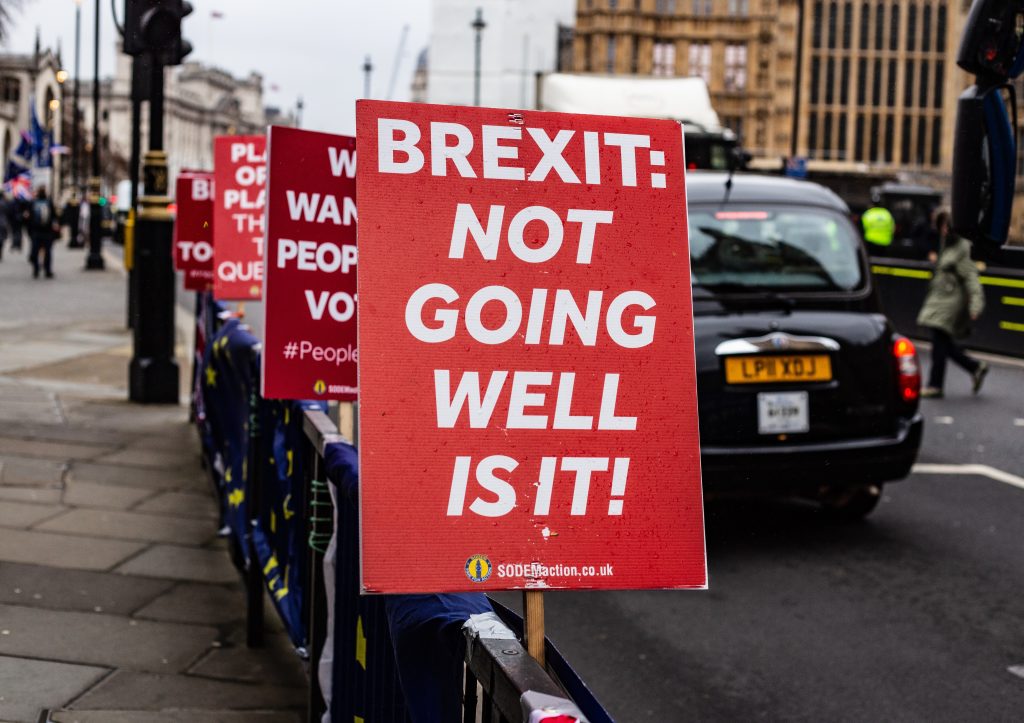
The question over what the British government does regarding the impending date for the UK to leave the European Union has been an ever more pressing one in Parliament over the last three weeks. As the 29th March looms into view Parliament has been left looking like a student who is doing all their holiday work the night before it is due. Debates around the Brexit deal have been never-ending and amendment after the amendment has entered the House under the names of MPs on both sides of the Speaker’s Chair. It seems as if this is any other Bill, that Parliament can take their time to get it right, but the horrible truth that Parliament cannot seem to understand is this; the Brexiteer’s dream of a prosperous, independent Britain is slowly slipping into the realm of fantasy.
Last night marked the third week in a row that Theresa May’s Brexit negotiations and subsequent deals have come under scrutiny. Thirteen days ago her original ‘Plan A’ was defeated in the largest defeat ever (230 votes) in British Parliamentary history. This was both an embarrassing and worrying defeat for the PM as the clock ticks down to the 29th March. Mrs May’s response to this crisis was the suggestion of cross-party talks; of consensus and compromise in the House at a time when Britain needed it most, whereas, Jeremy Corbyn immediately set in motion a badly concealed and unhelpful power grab in the tabling of a motion of no confidence; its only effect being dividing the opposition. The question became what to do next.
In these debates, the PM consistently remarked about the need and the desire to deliver on the promises made to the British public in 2016. It soon became clear after the referendum that the promised “£450 million a week to the NHS” that had sat so proudly on the side of the Brexiteer’s bus was destined to stay just there. Terms like ‘hard Brexit’, ‘soft Brexit’ and most frighteningly ‘no-deal Brexit’ have since been bandied about by political commentators and politicians alike as everyone tries to envisage a version of Brexit that works for them. It has become clearer, though, that none of these options will deliver on what the British public was promised by ‘Vote Leave in 2016. In his short time as Brexit Secretary Dominic Raab found out there was a big difference between “£450 million a week to the NHS” and, as he remarked in one speech explaining the result of a ‘no-deal Brexit’, “adequate food”. It became clear that the NHS wasn’t going to get their money and the British public aren’t going to get their promises, and possibly even their deal.
However, despite these seemingly minor shortcomings the PM seems as keen as ever to reach a deal, agreed on by Parliament, that will fulfil her own aspirations for Brexit Britain. Earlier this week Mrs May spoke of her desire to return to Brussels and renegotiate some terms of the deal, for instance, the Northern Irish backstop which has been a controversial talking point for both sides. This attitude has highlighted the lack of understanding the PM has of the EU negotiating a position in this deal. President of the European Council Jean-Claude Juncker has made it absolutely clear that there would be no further attempt at renegotiation. We got what we’re given and now we can take it or leave it. When Britain eventually leaves the EU Europe will still have the single market, free movement of labour and no tariff trade leading to EU countries having a secure and growing economy. There is no reason for the EU to renegotiate; as far as they’re concerned Britain are the idiots who wanted to leave. They don’t negotiate.
This position is not understood in the House and MPs, in the spirit of blind optimism, are conveniently ignoring it. This has led to MPs proposing various amendments on both sides of the House, mostly related to the ‘no-deal’ situation or the Northern Ireland backstop, which have highlighted a crippling irony in the Brexit situation. Vote Leave put across a key reason for the UK to leave the EU as reclaiming British sovereignty. It was felt by some that the British voice was not being heard in the European forum, however, with the EU unwilling to renegotiate a deal and any sort of decision being made in Westminster having absolutely no impact in Brussels, the decision to leave the EU has led to a situation in which this has never been more accurate. It does not matter that MPs voted last night for an amendment that rejected a ‘no-deal Brexit’ as whilst theoretically, this should bind the Westminster Parliament to this resolution without the cooperation of the EU, which has already been ruled out, this decision is worthless. This applies to all amendments to the Brexit deal. Britain has what it was given and it is up to Westminster to make that work. Instead, Parliament insists on pursuing vague fantasies of renegotiation.
Without a doubt, the biggest loser in Brexit Britain will be the British public. With experts saying the economy is going to suffer because of Brexit and Britain under the governance of the Conservative Party this means austerity and hardship. A visit by a UN Special Rapporteur examining poverty in the UK concluded that 1.5 million people are destitute. The NHS is underfunded and there are growing numbers of people using food banks. The struggling social welfare system cannot afford to be the subject of Tory cuts. Whilst some members of the British public wish we would just ‘hurry up and leave’ and others not wishing for us to leave at all it is clear that a referendum seeking to bring unity has in fact brought division. I cannot suggest a solution to this issue because there does not seem to be one that benefits Britain; a point made clear by some from the very start.
